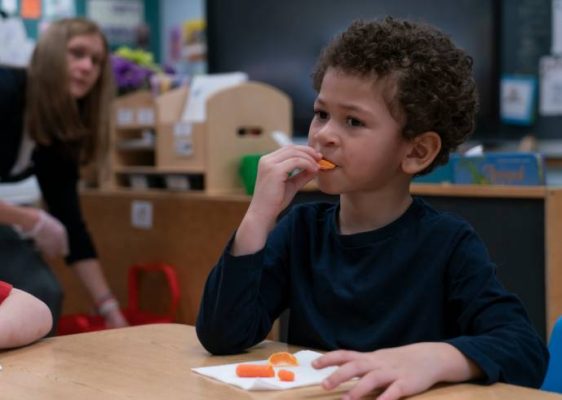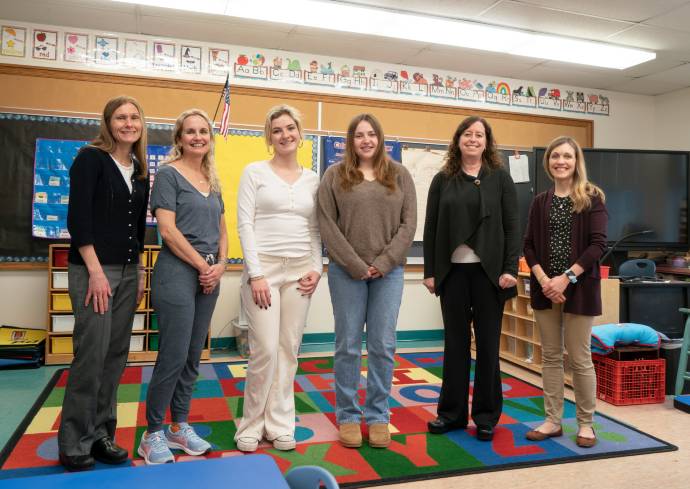Mindfully Growing Program Teaching Healthy Eating Habits to EE Pre-K Children
Do you like broccoli?
“I touched broccoli with my feet.”
You like eating watermelon, what does it smell like?
“Snow.”
What does snow taste like?
“Broccoli.”
Welcome to a Universal Pre-Kindergarten (UPK) Age 4 classroom at Elbridge Elementary School in Elbridge, New York, where it’s true that kids say the darndest things but with their five senses–sight, smell, hearing, taste and touch–they’re also learning healthy eating habits through the Mindfully Growing program.
The program’s curriculum is being taught by a team of professors and students from Syracuse University who, throughout this school year, have been visiting the UPK Age 4 classrooms at Elbridge Elementary on Thursday mornings. On the morning where broccoli was on the children’s minds, professors Lynn Brann and Rachel Razza and doctoral student Kristen Davis focused on touch as they hid baby carrots, clementines, and pea pods in a box and the children used their sense of touch to guess what they were.

After the food was pulled from the box, the children were able to taste it and discover that this healthy stuff isn’t so bad after all.
“The program is getting the students in touch with different ways to experience food,” Davis says. “They’re seeing food in a different way, connecting with where it comes from and ways they can slow down and enjoy it.”
Slowing down and enjoying the food is where the “mindfully” part of the Mindfully Growing program comes into play. The nutrition component is paired with mindfulness practices, which can foster greater empathy and communication skills, improve focus and attention, reduce stress and enhance creativity and general well-being.
“It works because the kids get excited about being included in activities that their friends are enjoying,” says Elbridge UPK Age 4 teacher Mark MacLachlan. “So, when they are offered to try raw shell peas with all of their friends at school, it’s an easy sell.
“Most of the kids really enjoyed them, too,” MacLachlan says.
A Mindful Journey
The Mindfully Growing curriculum was created by Brann, associate professor and Chair of the Department of Nutrition and Food Studies at the Falk College of Sport and Human Dynamics, and Razza, associate professor and chair of the Department of Human Development and Family Science (HDFS) at Falk College whose research focuses on the benefits of mindfulness-based programs for promoting resilience in schools and communities.
The initiative is funded by the Pediatric Nutrition Practice Group of the Academy of Nutrition and Dietetics, and Brann and Razza recently received a grant from the MetLife Foundation through the Lender Center for Social Justice to ensure the curriculum resonates with marginalized populations.
Brann says the curriculum is focused on 4-year-olds because it’s trying to get young children to develop an understanding of where food comes from and increase their acceptance of a variety of foods before they get set in their ways. The 10 lessons start with the origin of plants, fruits and vegetables, moves into using senses to explore foods, and finishes with lessons on hunger vs. fullness and sharing food together.
“It’s a good time to get them to explore food, and we do a tasting pretty much every lesson so they get an opportunity to try something new,” Brann says. “With this group, almost every one of them has tasted the food and several of them have asked for more, which is pretty exciting to see them being so open to it.”

Razza says with preschool children ages 3-5, there’s a significant increase in executive function skills, so they’re better able to delay gratification and inhibit their impulses. Thus, the interventions offered by the Mindfully Growing curriculum are important to introduce to this group of students.
“Can they control their impulses and self-regulate overall and also in the food context?” Razza says. “Lynn and I have been working to determine the overlaps between these two areas and how we can use intervention to simultaneously enhance both of them.”
While Brann, Razza and Davis are with one UPK class for 30 minutes, the other class is having a 30-minute yoga lesson with yoga instructor Colleen Smith from BeLive Yoga (beliveyoga@icloud.com) and undergraduate student Christina McCord from Falk College’s School of Social Work. Smith, who has been teaching yoga and mindfulness to preschool children in the Jordan-Elbridge Central School District for several years, helped connect Brann and Razza to Superintendent James Froio and Elementary School Principal Brooke Bastian because, as Smith says, she “continues to be impressed by their support of students and their willingness to offer yoga and programs or events that supplement the students’ daily education.”
In her yoga sessions, Smith says she helps the children learn how to self-regulate their bodies, breath and even emotions as she tries to “meet the children where they are” by matching their energy level and then bringing them to a brief time of rest.
“One thing that can be difficult for them is trying new experiences and foods,” Smith says. “The yoga and mindfulness lessons can help children pay attention to their bodies, thoughts and breath in the moment so they can self-regulate and make healthy and appropriate choices when presented with new or challenging experiences like a mindful eating lesson.”
Bastian, who’s in her fourth year as principal and 11th in the district, says Elbridge Elementary School has a unique UPK program because it offers a full day for both 3- and 4-year olds. Bastian says she and the teachers have enjoyed the partnership with Syracuse because they know the positive impacts that early intervention can have on students. “Mindfulness is a focus in UPK to help promote self-regulation, and when mindfulness is approached in a holistic way it can have a greater impact,” Bastian says. “We want children to develop healthy habits in general so food, which is highly motivating, is a great way to begin that mindful journey.”
For the remainder of this story on the Mindfully Growing program, please visit the Falk College website.




